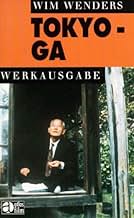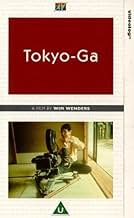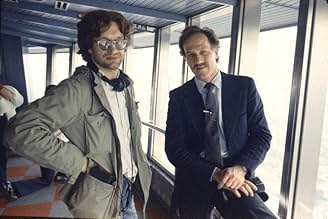AVALIAÇÃO DA IMDb
7,3/10
3,9 mil
SUA AVALIAÇÃO
Movido pelo trabalho do diretor Yasujirô Ozu, Wim Wenders viaja ao Japão em busca do Tóquio visto nos filmes de Ozu.Movido pelo trabalho do diretor Yasujirô Ozu, Wim Wenders viaja ao Japão em busca do Tóquio visto nos filmes de Ozu.Movido pelo trabalho do diretor Yasujirô Ozu, Wim Wenders viaja ao Japão em busca do Tóquio visto nos filmes de Ozu.
- Direção
- Roteirista
- Artistas
Avaliações em destaque
Tokyo-Ga (1985) was written and directed by Wim Wenders. This full-length documentary is a tribute to Japanese director Yasujirô Ozu. It's included as a special feature in the Criterion Collection edition of Ozu's movie Late Spring.
Wenders is a talented German New Age director, who admired Ozu's work. He went to Tokyo to learn more about the city and about Ozu.
The movie has a real dichotomy. Wenders interviews actor Chishû Ryû and cinematographer Yûharu Atsuta at length. Ryû appeared in almost all of Ozu's films, and Atsuta was his chief camera operator.
Each of them (separately) tells the same story. Ozu knew what he wanted, and he was prepared to go to any lengths to get it. Neither man always understood what Ozu was thinking. They did what he told them to do. Sometimes Ozu was happy, sometimes he wasn't. Both men said that they couldn't understand why something was right or wrong. They kept doing the same scene until Ozu was satisfied. So, in a way, Ozu was a tyrant. However, he was a very polite and friendly tyrant, and he directed great film after great film. Both men are firm in their love and admiration for him.
The other part of the film consists of Wenders wandering through Tokyo and ending up at a pachinko parlor, a golf range, and a factory where they make plastic "food" items to be displayed in restaurant windows.
Wenders' view of Tokyo is that it's a harsh, overcrowded city with no charm. That's what he shows us. Of course, no one can capture a city in part of one documentary. Possibly another director would give us a different view.
I think this documentary is worth seeing if you want to learn more about how Ozu worked and how he accomplished as much as he did. It's also interesting to see a foreigner's view of this city of nine million people. It's certainly not a must-see movie, but I'm glad I saw it.
Tokyo-Ga has a solid 7.4 IMDb rating. I thought it was even better than that, and rated it 9.
Wenders is a talented German New Age director, who admired Ozu's work. He went to Tokyo to learn more about the city and about Ozu.
The movie has a real dichotomy. Wenders interviews actor Chishû Ryû and cinematographer Yûharu Atsuta at length. Ryû appeared in almost all of Ozu's films, and Atsuta was his chief camera operator.
Each of them (separately) tells the same story. Ozu knew what he wanted, and he was prepared to go to any lengths to get it. Neither man always understood what Ozu was thinking. They did what he told them to do. Sometimes Ozu was happy, sometimes he wasn't. Both men said that they couldn't understand why something was right or wrong. They kept doing the same scene until Ozu was satisfied. So, in a way, Ozu was a tyrant. However, he was a very polite and friendly tyrant, and he directed great film after great film. Both men are firm in their love and admiration for him.
The other part of the film consists of Wenders wandering through Tokyo and ending up at a pachinko parlor, a golf range, and a factory where they make plastic "food" items to be displayed in restaurant windows.
Wenders' view of Tokyo is that it's a harsh, overcrowded city with no charm. That's what he shows us. Of course, no one can capture a city in part of one documentary. Possibly another director would give us a different view.
I think this documentary is worth seeing if you want to learn more about how Ozu worked and how he accomplished as much as he did. It's also interesting to see a foreigner's view of this city of nine million people. It's certainly not a must-see movie, but I'm glad I saw it.
Tokyo-Ga has a solid 7.4 IMDb rating. I thought it was even better than that, and rated it 9.
I love Wim Wenders and most of his films that I have seen. I love and venerate the films of the Japanese master Yasujirô Ozu. 'Tokyo-Ga', the documentary realized in 1985 by Wenders researching the echoes of the works of the great Japanese director 20 years after his death, trying to find what was left of the landscape, characters and spirit of his movies, was of great promise to me. I confess however that one plus one in this case did not make more than two or even equal two. The film, which I have seen in a retrospective of Wenders' earlier movies that started at the local cinematheque slightly disappointed me.
'Tokyo-Ga' is conceived as a travel journal with a definite goal. Wenders tells it in the opening, actually we will hear his voice for the whole duration of the film, even relaying and translating to German what the persons he interviews have to say. He flies to Japan to find what is left of the landscape of Tokyo that inspired the films of Ozu. On the plane he sees a movie and makes an ironic remark about commercial Hollywood movies, while we have a glimpse from ''On Golden Pond' actually not a bad film at all. The film seems to be a chronological journal of his first encounter with Japan. He meets with people who worked with Ozu and interviews them. He films almost everything he encounters - the metropolitan jungle of Tokyo in the 1980s (still looking futuristic even today), kids playing baseball in a cemetery, trains, many trains, Japanese men fascinated with electronic games, young people dancing rock in a park, a factory were the plastic models that represent dishes in Japanese restaurants are created. He meets fellow film makers and discusses cinema and the Japanese landscape with them. Some of the scenes are related vaguely with Ozu's films (the games, the trains). Some other seem completely unrelated. Wenders had come too late in his search. The spirit of Ozu is no longer there, not in the landscape in any case. It's another city, another country, another world. The process of change, of americanization, of fading out of the Japanese culture described by Ozu in his post-war movies had been completed.
I mostly liked the two interviews in the film - with one of his prefered actors and with the camera man. They brought back the personality of the great film maker, and also defined very well the relationship between the film director and his collaborators. The two were keeping for him the respect due to a father and master of his profession. At the same time we get from both the image of a creator who planned every detail of his films rigurously, who knew exactly why and how the film will be made, who had reached the genial simplicity of his expression by rigurous thinking and permanent cizeling of his artistic tools. Wenders' movie 'Tokyo-Ga' is very different, it's almost spontaneous filming as things happen. We can feel the deep respect of Wenders for Ozu, but in order to understand the art of the Japanese master there is no alternative but seeing his films.
'Tokyo-Ga' is conceived as a travel journal with a definite goal. Wenders tells it in the opening, actually we will hear his voice for the whole duration of the film, even relaying and translating to German what the persons he interviews have to say. He flies to Japan to find what is left of the landscape of Tokyo that inspired the films of Ozu. On the plane he sees a movie and makes an ironic remark about commercial Hollywood movies, while we have a glimpse from ''On Golden Pond' actually not a bad film at all. The film seems to be a chronological journal of his first encounter with Japan. He meets with people who worked with Ozu and interviews them. He films almost everything he encounters - the metropolitan jungle of Tokyo in the 1980s (still looking futuristic even today), kids playing baseball in a cemetery, trains, many trains, Japanese men fascinated with electronic games, young people dancing rock in a park, a factory were the plastic models that represent dishes in Japanese restaurants are created. He meets fellow film makers and discusses cinema and the Japanese landscape with them. Some of the scenes are related vaguely with Ozu's films (the games, the trains). Some other seem completely unrelated. Wenders had come too late in his search. The spirit of Ozu is no longer there, not in the landscape in any case. It's another city, another country, another world. The process of change, of americanization, of fading out of the Japanese culture described by Ozu in his post-war movies had been completed.
I mostly liked the two interviews in the film - with one of his prefered actors and with the camera man. They brought back the personality of the great film maker, and also defined very well the relationship between the film director and his collaborators. The two were keeping for him the respect due to a father and master of his profession. At the same time we get from both the image of a creator who planned every detail of his films rigurously, who knew exactly why and how the film will be made, who had reached the genial simplicity of his expression by rigurous thinking and permanent cizeling of his artistic tools. Wenders' movie 'Tokyo-Ga' is very different, it's almost spontaneous filming as things happen. We can feel the deep respect of Wenders for Ozu, but in order to understand the art of the Japanese master there is no alternative but seeing his films.
I first went to Japan in 1986 as a high school exchange student. I had been studying about Japan for the past 6 years and was very excited to finally go there to see it in person. Wim Wenders was in a similar situation. He had fallen in love with a particular Japanese film-maker Ozu Yasujiru. Wim had been influenced from an early age by Ozu's work, and he decided to go to Japan while in the middle of making "Paris, Texas." During the break in the making of the film in Los Angeles, Wim boarded a 747 and flew across the Pacific to Tokyo, a place he had never been to before. What we get to see when we watch this film, is not only an interview with the cameraman that worked for Ozu for 25 years, but also Wim's personal discovery of Japan. Much of the film is just straight documentary-type footage accompanied with some pretty weird music. Riding in a taxi at night. Riding in a train at night. Following a little boy who is too tired to walk in the underground shopping mall with his mom, and decides to just sit down. The Cherry Blossom Festival picnics in Tokyo, the dancers at Harajuku on Sundays. A particularly fascinating scene is of a company that manufactures the wax food models you see outside most restaraunts in Japan. Overall, a wonderful film for anyone who loves Japan or is just interested in it. I rate this film among Wim's best works. If you can find it, rent it.
the footage is lush and gorgeous, German camera-work of the 70s-80s of the highest caliber. but...the content I found ... appalling! it's been 15 or so years since I saw it and haven't thought about it in a long time, but was just reminded while suffering through this documentary about a feature film called "Jew Süss" ... but my impression of the overall tone is ineradicable . . . I have to admit I'd entirely forgotten the "Ozu love letter" element of the whole thing.
more enjoyable is a documentary about designer Yojhi Yamamoto that I saw at about the same time in this big Wim Wenders retrospective. another film that was a very sweet standout was "A Trick of the Light" about film pioneers whose work was eclipsed by developments of Lumiere in France starring Udo Kier, which I recommend highly.
Wim Wenders...is kind of a shallow filmmaker in my estimation. As with Tokyo Ga I'm sure he had no idea what a potentially offensive film he made. I remember particularly a sequence about some sort of Japanese pinball game that is insanely popular there, his reflections upon which seemed the fruit of a (lack of) intelligence of the sort that characterizes also that cinema excreta "Lost in Translation". the deep meaning of which seems to be "god what a bunch of freaks these Japs are for not speaking English and not modeling themselves after the oh so kewl savvy ironic US population what in god's name is wrong with them?!
more enjoyable is a documentary about designer Yojhi Yamamoto that I saw at about the same time in this big Wim Wenders retrospective. another film that was a very sweet standout was "A Trick of the Light" about film pioneers whose work was eclipsed by developments of Lumiere in France starring Udo Kier, which I recommend highly.
Wim Wenders...is kind of a shallow filmmaker in my estimation. As with Tokyo Ga I'm sure he had no idea what a potentially offensive film he made. I remember particularly a sequence about some sort of Japanese pinball game that is insanely popular there, his reflections upon which seemed the fruit of a (lack of) intelligence of the sort that characterizes also that cinema excreta "Lost in Translation". the deep meaning of which seems to be "god what a bunch of freaks these Japs are for not speaking English and not modeling themselves after the oh so kewl savvy ironic US population what in god's name is wrong with them?!
This had been on my watchlist for ages, but after watching the excellent Perfect Days, it became a top priority. Both have Wim Wenders exploring Japan, though Tokyo-Ga is a documentary, and one with a surprising focus on Yasujiro Ozu. When Wenders is focused on Ozu, and interviewing people who knew the legendary filmmaker, I think Tokyo-Ga is at its best.
There are other sections dedicated to just exploring technology and life in Japan, but these parts come up a little short at times. Wenders' narration can feel a little surface-level at times, or at least not as exceptional as Werner Herzog's would be, if he handled a film like this (he does have a cameo appearance here though, which was cool).
It's a pretty good watch. It doesn't do for the documentary genre what Perfect Days does for non-documentary films, by any means, but it's still fairly good for what it is, and was relatively interesting to me throughout.
There are other sections dedicated to just exploring technology and life in Japan, but these parts come up a little short at times. Wenders' narration can feel a little surface-level at times, or at least not as exceptional as Werner Herzog's would be, if he handled a film like this (he does have a cameo appearance here though, which was cool).
It's a pretty good watch. It doesn't do for the documentary genre what Perfect Days does for non-documentary films, by any means, but it's still fairly good for what it is, and was relatively interesting to me throughout.
Você sabia?
- Citações
Wim Wenders: It felt good just to look out the window. If only it were possible to film like that, I thought to myself, like when you open your eyes sometimes just to look without wanting to prove anything.
- ConexõesFeatured in De zee die denkt (2000)
Principais escolhas
Faça login para avaliar e ver a lista de recomendações personalizadas
- How long is Tokyo-Ga?Fornecido pela Alexa
Detalhes
- Data de lançamento
- Países de origem
- Idiomas
- Também conhecido como
- Tokyo Ga
- Locações de filme
- Empresas de produção
- Consulte mais créditos da empresa na IMDbPro
Contribua para esta página
Sugerir uma alteração ou adicionar conteúdo ausente
























